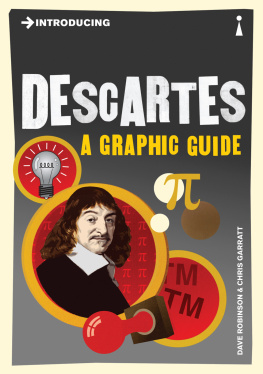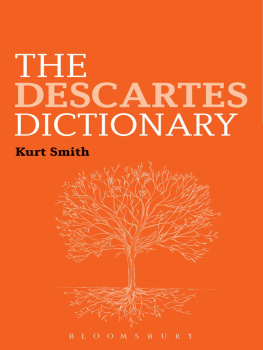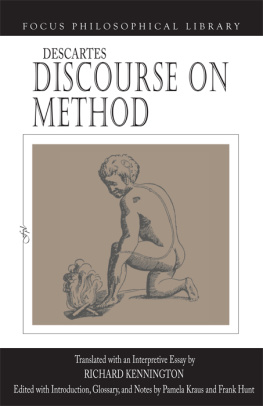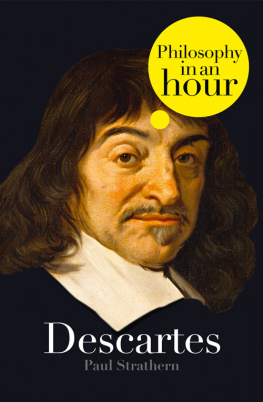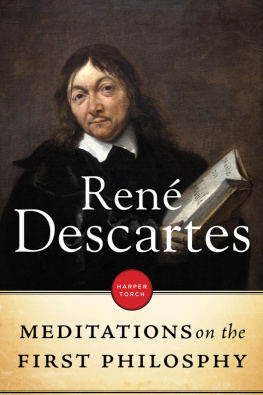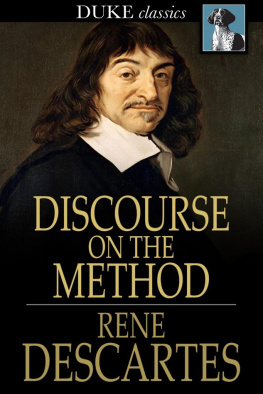Descartes René - Descartes: A Guide for the Perplexed
Here you can read online Descartes René - Descartes: A Guide for the Perplexed full text of the book (entire story) in english for free. Download pdf and epub, get meaning, cover and reviews about this ebook. City: London, year: 2008;2011, publisher: Continuum International Publishing, genre: Religion. Description of the work, (preface) as well as reviews are available. Best literature library LitArk.com created for fans of good reading and offers a wide selection of genres:
Romance novel
Science fiction
Adventure
Detective
Science
History
Home and family
Prose
Art
Politics
Computer
Non-fiction
Religion
Business
Children
Humor
Choose a favorite category and find really read worthwhile books. Enjoy immersion in the world of imagination, feel the emotions of the characters or learn something new for yourself, make an fascinating discovery.
- Book:Descartes: A Guide for the Perplexed
- Author:
- Publisher:Continuum International Publishing
- Genre:
- Year:2008;2011
- City:London
- Rating:5 / 5
- Favourites:Add to favourites
- Your mark:
- 100
- 1
- 2
- 3
- 4
- 5
Descartes: A Guide for the Perplexed: summary, description and annotation
We offer to read an annotation, description, summary or preface (depends on what the author of the book "Descartes: A Guide for the Perplexed" wrote himself). If you haven't found the necessary information about the book — write in the comments, we will try to find it.
Descartes: A Guide for the Perplexed — read online for free the complete book (whole text) full work
Below is the text of the book, divided by pages. System saving the place of the last page read, allows you to conveniently read the book "Descartes: A Guide for the Perplexed" online for free, without having to search again every time where you left off. Put a bookmark, and you can go to the page where you finished reading at any time.
Font size:
Interval:
Bookmark:
Continuums Guides for the Perplexed are clear, concise and accessible introductions to thinkers, writers and subjects that students and readers can find especially challenging. Concentrating specifically on what it is that makes the subject difficult to grasp, these books explain and explore key themes and ideas, guiding the reader towards a thorough understanding of demanding material.
Adorno: A Guide for the Perplexed, Alex Thomson
Deleuze: A Guide for the Perplexed, Claire Colebrook
Derrida: A Guide for the Perplexed, Julian Wolfreys
Descartes: A Guide for the Perplexed, Justin Skirry
Existentialism: A Guide for the Perplexed, Stephen Earnshaw
Freud: A Guide for the Perplexed, Celine Surprenant
Gadamer: A Guide for the Perplexed, Chris Lawn
Habermas: A Guide for the Perplexed, Eduardo Mendieta
Hegel: A Guide for the Perplexed, David James
Hobbes: A Guide for the Perplexed, Stephen J. Finn
Hume: A Guide for the Perplexed, Angela Coventry
Husserl: A Guide for the Perplexed, Matheson Russell
Kant: A Guide for the Perplexed, TK Seung
Kierkegaard: A Guide for the Perplexed, Clare Carlisle
Levinas: A Guide for the Perplexed, B. C. Hutchens
Leibniz: A Guide for the Perplexed, Franklin Perkins
Merleau-Ponty: A Guide for the Perplexed, Eric Matthews
Nietzsche: A Guide for the Perplexed, R. Kevin Hill
Plato: A Guide for the Perplexed, Gerald A. Press
Quine: A Guide for the Perplexed, Gary Kemp
Ricoeur: A Guide for the Perplexed, David Pellauer
Rousseau: A Guide for the Perplexed, Matthew Simpson
Sartre: A Guide for the Perplexed, Gary Cox
Spinoza: A Guide for the Perplexed, Charles Jarrett
Wittgenstein: A Guide for the Perplexed, Mark Addis

Continuum International Publishing Group
The Tower Building | 80 Maiden Lane |
11 York Road | Suite 704 |
London SE1 7NX | New York NY10038 |
www.continuumbooks.com
Justin Skirry 2008
All rights reserved. No part of this publication may be reproduced or
transmitted in any form or by any means, electronic or mechanical,
including photocopying, recording or any information storage or retrieval
system, without prior permission from the publishers.
First published 2008
British Library Cataloguing-in-Publication Data
A catalogue record for this book is available from the British Library.
ISBN-10: HB: 0-8264-8985-0
PB: 0-8264-8986-9
ISBN-13: HB: 978-0-8264-8985-2
PB: 978-0-8264-8986-9
Library of Congress Cataloging-in-Publication Data
Skirry, Justin.
Descartes : a guide for the perplexed / Justin Skirry.
p. cm.
Includes bibliographical references (p. ) and index.
ISBN 978-0-8264-8985-2 - ISBN 978-0-8264-8986-9
1. Descartes, Ren, 1596-1650. I. Title.
B1873.S55 2008
194-dc22
2007027773
First and foremost I would like to thank the editors at Continuum for their understanding and support in completing this project. I would also like to thank all those at the Cochrane-Woods Library of Nebraska Wesleyan University for their tireless efforts and dedicated service. Finally, I would like to thank my research assistant Kiran Bhardwaj for her fresh eye and insightful comments and criticisms.
AT | Descartes, Ren (1974-89, Charles Adam and Paul Tannery, eds), uvre de Descartes, 11 vols. References are made to volume and page number. |
CSM/CSMK | Descartes, Ren (1984-91, John Cottingham, Robert Stoothoff, Dugald Murdoch and Anthony Kenny, trans.), The Philosophical Writings of Descartes, 3 vols. References are made to volume and page number. |
For my wife
Sarah Jane
Ren Descartes was born to Joachim Descartes and Jeanne Brochard on 31 March 1596 in La Haye, near Tours, France. The Descartes clan was a bourgeois family composed of mostly doctors and some lawyers. Joachim Descartes was a lawyer who spent most of his career as a member of provincial French parliaments. After the death of their mother, which occurred soon after Rens birth, the Descartes children (Ren, his sister Jeanne and brother Pierre) were sent to live with their maternal grandmother, Jeanne Sain. They remained with her until their father remarried in 1600. Not much is known about his early childhood, but Ren is thought to have been a sickly and fragile child, so much so that when he was sent to board at the Jesuit college at La Flche at Easter 1607, he was not obligated to rise at 5:00am with the other boys for morning prayers but was allowed to rest until 10:00am Mass. At La Flche Descartes completed the usual courses of study as well as the philosophical curriculum with courses in the verbal arts of grammar, rhetoric and dialectic (or logic) and the mathematical arts which comprised arithmetic, music, geometry and astronomy. His course of study at the college was capped off with courses in metaphysics, natural philosophy and ethics. Descartes graduated from La Flche in 1614.
In 1615-16 Descartes received a degree in civil and canon law from the University of Poitiers. However, despite his degree, he never pursued a law career. Instead, he chose to see the world as a volunteer in the army of Maurice of Nassau. It is during this time that he met Isaac Beekman, who was perhaps the most important influence on his early adulthood. It was Beekman who rekindled Descartes interest in science and opened his eyes to the possibility of applying mathematical techniques to other fields. Descartes, however, remained a soldier and was stationed at Ulm in Germany where he had three dreams that gave him a vision of a universal science and inspired a search for a new method. Descartes began his work on a method entitled Rules for the Direction of the Mind at about this time, sporadically working on it from about 1620 until finally abandoning the project for good in 1628.
It was also in 1628 that Descartes moved to the Netherlands. He remained there, despite frequent changes of address, until he moved to Sweden at the invitation of Queen Christina in late 1649. He moved to the Netherlands to achieve a solitude and quiet that he could not attain with all the distractions of Paris. It was here in 1629 that Descartes began work on The World, which was intended to provide a mechanistic picture of the world. But the condemnation of Galileo led him to suppress its publication (see Chapter 6.1 for more). Although many of its principles and explanations were published in later works, The World itself never saw the light of day. However, this did not deter him from his own scientific enquiries or from providing mechanistic explanations for a wide variety of phenomena. Some of these findings were published in French in 1637 in the form of three essays entitled Geometry, Dioptics and Meteors, which had a preface attached to them entitled Discourse on Method.
Font size:
Interval:
Bookmark:
Similar books «Descartes: A Guide for the Perplexed»
Look at similar books to Descartes: A Guide for the Perplexed. We have selected literature similar in name and meaning in the hope of providing readers with more options to find new, interesting, not yet read works.
Discussion, reviews of the book Descartes: A Guide for the Perplexed and just readers' own opinions. Leave your comments, write what you think about the work, its meaning or the main characters. Specify what exactly you liked and what you didn't like, and why you think so.





